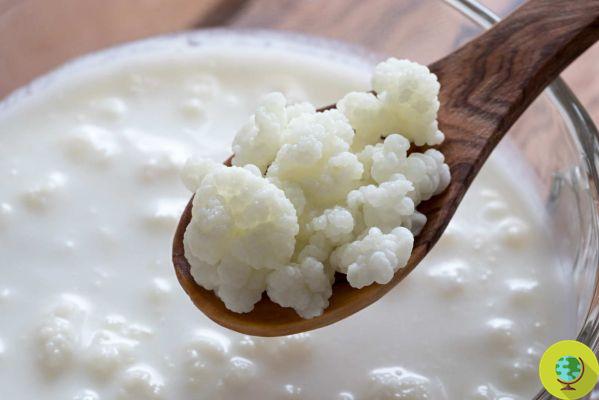Let's find out where to find the precious grains to produce kefir at home, fermented milk with ancient origins and a thousand benefits
Kefir ranks among the healthiest drinks in the world, which is why it is considered by many peoples to be a long life elixir. It is nothing more than a fermented milk similar to yogurt, with a slightly acidic (but pleasant) taste and very rich in lactic ferments, amino acids and vitamins. The numerous properties of this drink originating from the Caucasus have been known since ancient times, but only in recent years has kefir also gained popularity in our country and is now also sold on supermarket shelves.
However, there are those who prefer to self-produce it at home. How? Using precious grains, whose true and ancient origin is still shrouded in mystery. But where can you find quality grains and how to avoid scams? Let's find out everything there is to know about these "little pearls" of health and the precautions to follow.
Read also: Kefir and yogurt: what are the differences and which one to prefer?
What are kefir grains and why are they so valuable
Kefir grains consist of a polysaccharide called kefiran, which hosts colonies of bacteria (those of the genus Lactobacillus are predominant) e yeast which live in symbiosis and are precious for the organism. The probiotics contained in kefir can help solve various problems, especially digestive or intestinal ones, thanks to the ability to rebalance the bacterial flora.
The small kefir grains have a whitish color and a gelatinous appearance and vaguely resemble the shape of cauliflowers. Preparing kefir at home using grains is very simple: what you need is a glass jar and some milk. And for those who are vegan, there is also the water variant.
Read also: Kefir: benefits and how to prepare milk kefir and the vegan water-based variant
Kefir grains tend to multiply and grow in size, but it is good to know that their composition of bacteria and yeasts varies according to their origin and their culture environment. For this reason it is essential to choose quality grains whose exact origin is known.
Where to find kefir grains

@Madeleine Steinbach / Shutterstock
But where are kefir grains found? As for dehydrated kefir grains, you can also buy them in some online stores and even on Amazon.
Different speech for fresh grains, which are not sold in stores and the only way to get them is to contact someone who has them and is willing to give or sell them. A bit like with sourdough, it is a good rule that kefir grains are not purchased, but that it is received as a gift from a person who has them available. In fact, that of kefir is a very ancient tradition, in which the spirit of sharing prevails. In the past, in the Caucasus region, the granules were handed down from mother to daughter on the occasion of the wedding.
In recent years, groups and Facebook pages dedicated to kefir grains have multiplied, which are often given away or sold for a few euros.
Read also: Kefir: what contains what you buy at the supermarket and which one to choose
Beware of "bad donors"
Often, however, the risk of a rip-off is just around the corner. On social media, in particular on Facebook, you can come across the so-called "bad donors" of kefir grains. These are people, perhaps inexperienced, who do not correctly follow the rules of fermentation and conservation of grains. Therefore, it can happen to buy or receive free of little active grains and of poor quality, with which the kefir will be decidedly poorer in beneficial properties. It is critically important to speak with the donor in question to learn more about the methods used to grow their colony and make sure they follow up on hygiene standards. Always ask if they are grains that have been frozen.
Another pitfall is that of converted milk grain donors. Many people pass off converted milk grains as grains of water. This is a fairly common practice that leads to the production of a drink that has little to do with the original kefir. Before buying or receiving grains as a gift, it is good practice to talk to the donor, deepening the techniques used for cultivation.
Finally, several fake donors also circulate on the net, people who ask for money in exchange for kefir grains, masking the request with the words "reimbursement of shipping costs", very often inflated or undocumented. To avoid scams, it is therefore advisable to always ask for a receipt of the expenses incurred.
Is it better to opt for fresh or dehydrated kefir grains?
In addition to fresh kefir grains, there are also dehydrated ones. As we have seen, the best way to get the first is to contact a friend or someone who grows them at home. If of quality, fresh grains immediately produce excellent kefir. In case you decide to buy them online, for example on a Facebook group, they must be immediately placed in a glass jar, where the milk is added, to prevent them from becoming impoverished.
Unlike fresh ones, which are ready to use, dehydrated kefir grains need to be rehydrated and it can take up to a week to reactivate them. Dried grains have longer storage times and are the ideal solution for those who face long journeys.
Read all our articles on kefir:
- Kefir and yogurt: what are the differences and which one to prefer?
- Kefir: good, but not for everyone! Possible damage and side effects
- Water kefir: 50 Questions and Answers to the Most Frequent Doubts
- Kefir: what contains what you buy at the supermarket and which one to choose
- Oladyi, the recipe for the fluffy Russian pancakes prepared with Kefir


























